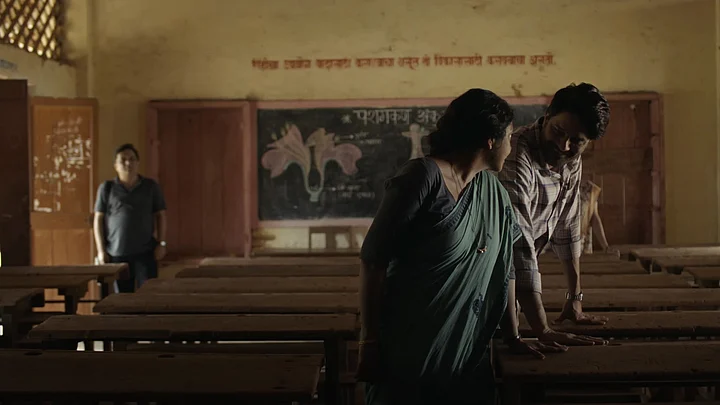In Deepti Naval and Kalki Koechlin-starrer Goldfish, a woman tries to come to terms with her mother’s dementia even as they both struggle to find a common language to find a connection. The film is a poignant look into the hold memories have on us and our very identity. A similar thread runs through Avinash Arun Dhaware’s Three of Us.
After Shailaja Patankar (Shefali Shah) learns that she will s0on lose her memory, she decides to go back to the small town in Konkan where she grew up; her earliest memories are the ones she wants to reconcile with before she, in a way, loses herself. Her husband Dipankar Patankar (Swanand Kirkire) accompanies her on this journey and is troubled by the entry of her former friend (and the one-that-got-away) Pradeep Kamat (Jaideep Ahlawat).
As Shailaja and Pradeep roam the streets of their town, reminiscing, and often hinting at what used to be and what could have been, a part beautiful and part painful picture of Shailaja’s past is painted.
Since the couple doesn’t reveal much about their decision to visit, the people from Shailaja’s past just treat her like an old friend who has come to visit instead of a woman trying to desperately grasp on to a life she left behind.
The ‘what ifs’ in Three of Us could remind you of Celine Song’s stunning film Past Lives but both films manage to evoke the same warmth.
It is also in part because Kirkire plays Dipankar with the same hesitation and unconditional support as John Magaro.
Jaideep Ahlawat continues to give one brilliant performance after another; this one follows his exceptional turn in Jaane Jaan. Though he feels unconvincing in the setting, his understanding of the character is pitch perfect. You can almost see the way inspiration enters his mind once again (he is a poet) after he meets Shailaja. It is always apparent that he understands that his connection to Shailaja is one partially erased by time and he always seems, even at his most indulgent, tied to his life with his wife.
If Ahlawat is a master class in consistently churning out great performances, so is Shefali Shah. This is a tough role to play – a woman who is hiding her true motives from those around her while also trying to find closure and deal with both the memories she wants to relive and the ones she wants to keep buried. Shah meets all these demands perfectly.
One can see in her eyes the desire to relive and store as much as possible; the difference between reminiscing and pretending to remember is evident in her eyes.
In his earlier work School of Lies, director Dhaware explored how the same moment or world can look so starkly different when viewed from the eyes of a child and an adult. As years pass by, everything that seemed almost magical as a child can either be dripping with nostalgia as an adult or seem lifeless and mundane. In Three of Us, it’s a mix of both. While the film is beautifully shot, capturing the essence of Konkan, there is often a feeling of the characters standing in a space they’ve outgrown.
But it is not just the spaces – they’ve all either become complacent or moved on in their relationships in life as well. When Shailaja visits her old classroom, she seems like an outsider in a space but at her Bharatanatyam classes, she behaves like she has been transported back to life as an amateur artist. The film is never asking you to choose between nostalgia and closure – Three of Us just is. Make of that what you will.
Varun Grover’s dialogues capture this emotion well but there are times when the metaphors feel out of place. When the interactions between the characters are at their most vulnerable, writing that is perhaps too finessed, forces you to take a step back and remember you’re watching a film.
The film doesn’t make villains out of any of the three, something I also greatly appreciated in Song’s feature. Even the sight misstep on Dipankar’s part makes sense for his character. Even though this is Shailaja’s journey, she does not exist in isolation – the others around her have also had experiences that shape who they are.
Three of Us could be viewed as three different films within other stories– Shailaja’s past, present, and future, the story through Shailaja’s eyes or through the eyes of Pradeep or Dipankar. Perhaps, you would even want to see the story through Pradeep’s wife’s eyes; maybe through Shailaja’s son’s. And yet, at no point does the film feel like it is being told wrong. Only that it’s a story with possibilities; something we could all use once in a while.
(At The Quint, we question everything. Play an active role in shaping our journalism by becoming a member today.)
